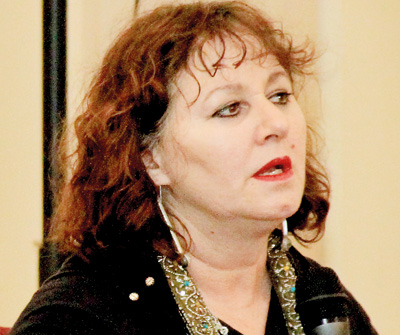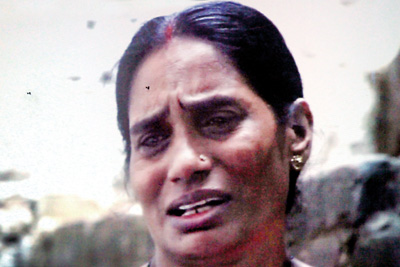Sunday Times 2
Documenting rape: In defence of India’s daughter
December 16 marked three years since the gang rape of Jyoti Singh in New Delhi. The 23-year-old physiotherapy student was returning home with a friend, after watching the movie “Life of Pi” and had boarded a private bus on which the brutal gang rape occurred. The macabre details which emerged about the incident were grim. After the rape, Jyoti battled for her life and succumbed to the severity of her injuries 13 days later.

At a Colombo event, Leslee Udwin relating the story behind the documentary. Pic by Indika Handuwala
Instead of being relegated to a statistic, Jyoti’s gang rape triggered ripples of anger, frustration and sorrow which picked up momentum, rising into waves of protests across India. The rape spurred an unprecedented response from civil society and garnered international attention. The response to the rape then led to a report outlining recommendations for amending existing laws for sexual crimes. The report was prepared by a three-member commission headed by former Chief Justice J.S. Verma.
It’s impossible to pinpoint what it was about the case that caught the public’s attention. It could have been the senseless violence perpetrated by the six men or the sphinx-like victim which the public began to piece from shards of news stories. At that point in time her name was still unknown and she was bestowed names such as Nirbhaya and India’s daughter. Over the years, people have tried to tease out the specifics as to what elicited such an unprecedented response to this gang rape and how one woman unwittingly became a part of a nation’s narrative but it’s a question which resists an easy answer.
Victim’s crusade
Based in Denmark when protests erupted in pockets of India three years ago, Leslee Udwin was moved by the force of the demonstrators. A rape victim herself, she sought permission from her family and spent six months reading everything she could lay her hands on about the case before she headed to New Delhi. The choice to make a documentary then on, Leslee explains, was an instinctive one — it would have been crude to fictionalise Jyoti’s story and it was always meant to be a film for campaigning. In Colombo last week for a screening of the documentary and discussions on pioneering Human Rights education as a compulsory component in Sri Lankan schools, Leslee Udwin discussed her documentary, ‘India’s Daughter’ with the Sunday Times.
After months of filming, Leslee was confronted with 87 hours of footage which had to be whittled down to an hour long documentary, multiple interviews and no directorial experience to fall back on — although armed with production expertise, this was her first stab at directing. Leslee took a three-pronged approach to the film. She decided to make it a tribute to Jyoti, to put the protests at the crux of the documentary and turn the spotlight on the rapists to understand the motivation behind the crime. The documentary paints Jyoti through the eyes of her parents and a friend, features snippets from the protestors, activists and legal personnel to form the backdrop and repercussions of the case and isn’t an easy film to watch.
The juxtaposition of one of the rapists, the families of the rapists and the powerful grief of the victim’s parents is a particularly disconcerting moment in the film. “When I juxtapose the parents of the rapists and the grief of the mother of the rapist with the grief of the mother of the victim, it is for a particular reason because I myself got the insight at a certain point in those interviews where I thought, ‘My God. These are all victims of what has happened here’. And they are victims in a true sense because the overriding insight and shock and reversal of expectation that I got is that these men are not the monsters that we would love to believe they are. It would be very reassuring for us as society has a tendency to try and sanitise, to try and marginalise these perpetrators as though they have nothing to do with us, to distance ourselves from them. And I’m afraid we simply cannot do that if we are to be honest in our examination of this issue. Because we are responsible for them. We have programmed them and we’ve taught them how to think,” explains Leslee carefully.
 Tihar jail interview
Tihar jail interview
“When a girl child is born and is unwelcome in a particular culture do we not think that the little boys surrounding that girl, drink in and imbibe this attitude to that girl? When a boy’s older sister has to wait to eat last at the table, what do we think we teach these boys? We’re teaching them to devalue girls. So why are we surprised when they take that one step further? …. You cannot teach someone that someone else, on the basis of their gender, is lesser or of no value compared to yourself.”
The film focuses on the December 16th gang rape in New Delhi three years ago but ends with global statistics of violence against women, “so that there is not a single viewer who can look at it and think they’re off the hook”. What garnered the most controversy and publicity for the documentary however, were the interviews in Tihar Jail with one of the rapists and quotes by their legal counsel.
Jyoti’s story is overridden by the graphic detail of the incident being related to the viewer in the rapist’s deadpan soliloquy along with an alarming justification of the crime. This is padded with provocative quotes provided by the legal counsel for the rapists. The backlash resulted in a blanket ban on the film being screened in the country.
While Leslee chalks the kneejerk reaction to nationalistic fervour of those who put the image of a country above the welfare of their women and girls, some of the film’s vocal critics are key figures campaigning for women’s rights and safety in India. While most were unequivocal that a ban was not warranted, there was concern over giving a rapist such a prominent platform as well as the timeliness of the documentary’s release (the trial of the rapist interviewed in the film was still underway). Other critics objected to the title of the documentary, citing that it invokes the very protectionism of patriarchy in which rape culture around the world is steeped in. While others voice that the “white saviour” tonality, which tinges the campaign and promotion of the film, hints that brutality against women was a socio-cultural problem unique to India.
“I fly at thirty thousand feet above it, that’s how I deal with it [the criticism]. The bottom line is this – It’s a distraction. It’s a way of trying to distract people from looking in the mirror, from the truth,” asserts Leslee, vehemently dismissing the criticism. “Attack the film, on the basis of this is not true – if you will, if you dare, if you can. Don’t try and shoot the messenger because you don’t like the message….
“At the end of the day, it’s a post-colonial chip on the shoulder that is responsible for this accusation of white saviour complex. It’s racist, it’s reductive and it’s not conducive to change. Talk about the message. If you have a problem with the message, attack the message but its troll-like behaviour to say the message isn’t worth listening to because it is delivered by someone who is white skinned”.
Human rights in schools
With the film’s campaign underway and the Oscar campaign come to a close, these days Leslee has discarded the role of filmmaker and is now campaigning as CEO and Founder of the Equality Studies Global Initiative. The initiative aims to promote the designing of a global human rights curriculum in schools and has garnered support from 27 countries so far. The campaign seeks to add Human Rights Education as a compulsory educational component during a child’s formative years in school’s around the world. While negotiations are still underway and curriculums and resources are in the pipeline, Sri Lanka is expected to be the first country to pilot the programme in 2017.

